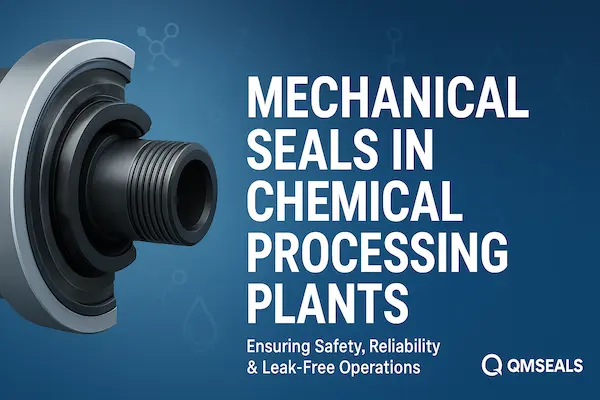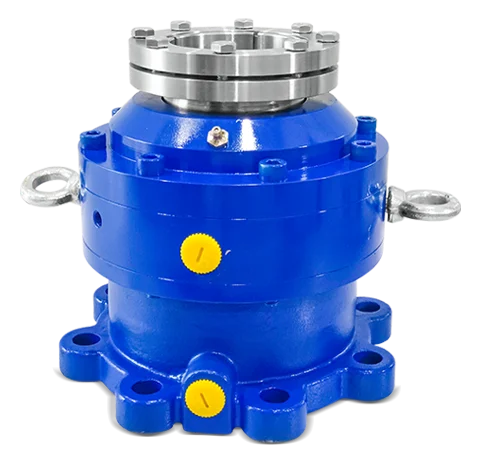Posted At: Sep 08, 2025 - 518 Views

The Role of Mechanical Seals in Chemical Processing Plants
Chemical processing plants deal with some of the most demanding industrial environments, where pumps and rotating equipment are constantly exposed to corrosive, abrasive, and high-temperature fluids. To ensure safe and efficient operations, one of the most crucial components used in these facilities is the mechanical seal.
In this blog, we’ll explore the importance of mechanical seals in the chemical industry, their role in maintaining safety and efficiency, and why they are preferred over traditional sealing methods. For more details click here.
Why Mechanical Seals Are Critical in Chemical Processing Plants
Pumps in chemical industries handle aggressive and toxic fluids. If these fluids leak, they can cause:
Environmental hazards – chemical leaks contaminate soil and water.
Health risks – harmful exposure to plant workers.
Equipment damage – corrosion reduces pump life and increases downtime.
High maintenance costs – frequent replacement of packing or seals.
This is where chemical mechanical seals come into play. Unlike gland packing, they provide leak-free sealing with higher reliability and longer service life, making them essential in chemical plants.
Applications of Mechanical Seals in the Chemical Industry
Mechanical seals are widely used in:
Centrifugal pumps for chemical transfer
Reactors and mixers in processing plants
Agitators handling viscous or corrosive fluids
Compressors for gas handling
Specialty pumps dealing with solvents, acids, and hydrocarbons
By maintaining tight sealing, mechanical seals help prevent hazardous leaks and improve operational efficiency.
Key Benefits of Using Mechanical Seals in Chemical Plants
Leak Prevention
Seals provide a tight barrier between the pump shaft and fluid, ensuring no leakage even under extreme pressure.
Chemical Resistance
Special materials like PTFE, Viton, Hastelloy, and Silicon Carbide are used to withstand corrosive chemicals.
Extended Equipment Life
By reducing shaft wear and preventing contamination, seals increase the lifespan of pumps and other rotating equipment.
Energy Efficiency
Unlike packing, seals reduce friction, lowering power consumption and operating costs.
Compliance with Safety Standards
Mechanical seals support industry regulations like API 682, ensuring safe operation in hazardous environments.
Types of Mechanical Seals for Chemical Processing
Choosing the right seal depends on fluid type, pressure, and temperature. Common options include:
Single Mechanical Seals – cost-effective, used for less hazardous fluids.
Double Mechanical Seals – recommended for highly toxic or corrosive chemicals.
Cartridge Seals – easy to install and replace, reducing downtime.
Bellows Seals – designed for corrosive or crystallizing chemicals.
Material Selection for Chemical Mechanical Seals
Material compatibility is critical in the chemical industry. Some common combinations include:
Seal Faces: Silicon Carbide, Tungsten Carbide, Carbon
Secondary Seals (O-rings): PTFE, Viton, Kalrez
Metal Parts: Stainless Steel, Hastelloy, Inconel
Correct material selection ensures durability, reduces failures, and improves sealing performance.
Challenges Faced by Mechanical Seals in Chemical Plants
Despite their advantages, seals face challenges like:
Chemical attack on elastomers
Thermal shocks due to temperature variations
Crystallization of fluids around the seal faces
Dry running caused by improper lubrication
To overcome these, regular seal monitoring and maintenance is essential.
Best Practices for Seal Maintenance in Chemical Plants
Proper Installation – follow manufacturer guidelines to avoid misalignment.
Seal Support Systems – use barrier fluids, flush plans, and cooling systems.
Condition Monitoring – track vibration, temperature, and leakage rates.
Scheduled Inspections – replace worn-out parts before failure occurs.
Use of Cartridge Seals – simplifies replacement and reduces errors.
Future of Mechanical Seals in the Chemical Industry
With stricter environmental regulations and increasing focus on sustainability, mechanical seals are evolving. Advanced designs now focus on:
Low-emission sealing technology
Dry-running capability
Improved materials for aggressive fluids
Digital monitoring systems for predictive maintenance
These innovations ensure chemical processing plants remain safe, reliable, and efficient.
Conclusion
The role of mechanical seals in chemical processing plants cannot be overstated. They are vital for preventing leaks, ensuring worker safety, improving energy efficiency, and complying with environmental standards. By choosing the right chemical mechanical seal and maintaining it properly, industries can achieve long-term reliability and cost savings.
For businesses operating in the chemical sector, partnering with a trusted mechanical seal manufacturer ensures access to high-performance seals designed to withstand the toughest chemical environments.


